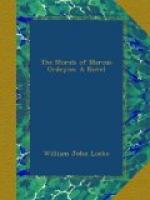soul in God’s universe who has a spark of admiration
for this most puissant and most felicitous monarch
crowned by God Emperor and King of the greater part
of Europe (and docked of most of his pretensions by
the Treaty of Utrecht)? We only remember the
forcible-feeble person by his Pragmatic Sanction, and
otherwise his personality has left in history not
the remotest trace. And yet, on the 12th February,
1723, a profoundly erudite, subtle, and picturesque
historian grovels before the man and subscribes himself
“Of your Holy Caesarean and Catholic Majesty
the most humble and most devoted and most obsequious
vassal and slave Pietro Gianone.” What
ruthless judgments posterity passes on once enormous
reputations! In Gianone’s admirable introduction
we hear of “
il celebre Arthur Duck, il quale
oltro a’ con confini della sua Inghilterra volle
in altri a piu lontani Paesi andav rintracciando l’uso
a l’autorita delle romane leggi ne’ nuovi
domini de’ Principi cristiani; e di quelle di
ciascheduna Nazione volle ancora aver conto:
le ricerco nella vicina Scozia, e nell’ Ibernia;
trapasso nella Francia, e nella Spagna; in Germania,
in Italia, a nel nostro Regno ancora: si stese
in oltre in Polonia, Boemia, in Ungheria, Danimarca,
nella Svezia, ed in piu remote parti.”
A devil of a fellow this celebrated English Arthur
Duck, who besides writing a learned treatise
De
Usu et Auth. Jur. Civ. Rom. in Dominiis
Principum Christianorum, was a knight, a member
of Parliament, chancellor of the diocese of London,
and a master in chancery. Gianone flattens himself
out for a couple of pages before this prodigy whom
he lovingly calls
Ariuro, as who should say
Raffaelo or Giordano; and now, where in the hearts
of men lingers Sir Arthur Duck? For one thing
he had a bad name. Our English sense of humour
revolts from making a popular hero of a man called
Duck. Yet we made one of Drake. But there
was something masculine about the latter: in fact,
everything.
I am afraid it was rather late when I got to Judith.
CHAPTER II
May 22d.
I wonder whether I should be happier now if I had
lived in a garret “in the brave days when I
was twenty-one,” if I had undergone the lessons
of misery with the attendant compensations of “une
folle maitresse, de francs amis et l’amour des
chansons,” and had joyous-heartedly mounted
my six flights of stairs. I lived modestly,
it is true; but never for a moment was I doubtful
as to my next meal, and I have always enjoyed the creature
comforts of the respectable classes; never did Lisette
pin her shawl curtain-wise across my window.
Sometimes, nowadays, I almost wish she had.
I never dreamed of glory, love, pleasure, madness,
or spent my lifetime in a moment, like the singer
of the immortal song. Often the weary moments
seemed a lifetime.
And now that I am forty, “it is too late a week.”
Boon companions, of whom I am thankful to say I have
none, would drive me crazy with their intolerable
heartiness. I once spent an evening at the Savage
Club. As for the folle maitresse—as
a concomitant of my existence she transcends imagination.




